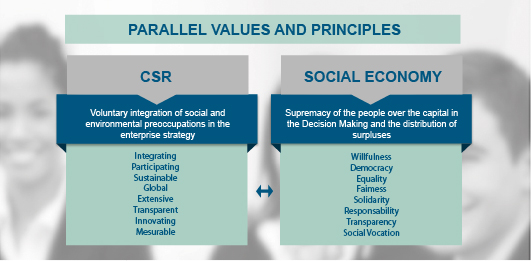

• Corporate Social Responsibility (CSR) is configured as new form of governance in enterprises and the role they play in society.
• CSR establishes new ways to organise labour and to relate to the environment, a new business practice that responds to the current concerns of society (the traditional instruments of the Welfare State are no longer as efficient.)
• The implementation of a corporate social responsibility policy in the enterprise is voluntary, without prejudice to Government advancing in the legal regulation thereof.
• CSR is a new business strategy that involves enterprises committing to a series of values regarding society and the market.
• The Social Economy Enterprise is a form of business that is characterised by: “democratic organisation”, “prevalence of persons over capital”, “share of profits/results using collective criteria”, “especially committed to the environment” and being a “generator of social cohesion”.
• Corporate Social Responsibility is characterised by encompassing those business practices that include social, environmental and labour concerns in the enterprise. They show an interest for the environment and people by implementing business techniques that are based on democracy.
• There are certain coincidences between the principles and values fostered by corporate social responsibility and the Social Economy business fabric.
• The characteristics of Social Economy enterprises make it possible to consider such enterprises as privileged examples of socially responsible economies. In a way, it could be said that they are precursors of CSR. They seek the democratisation of enterprises (inwardly), as the best way to make them true “citizens’ enterprises” (outwardly, towards society.)
• Socially responsible practices and Social Economy enterprises are based on reference values, they operate on the market using efficacy and competitiveness criteria together with solidarity and social cohesion criteria.
• Enterprises that implement socially responsible practices prove their commitment to the society that allows them to build a certain level of excellence in their functioning.
• Social Economy considers it is necessary to measure corporate social responsibility in order to put the level of commitments made by enterprises to CSR into objective terms.
• To this end, Social Economy uses its own implementation of CSR policy and specific indicators endorsed by the Global Reporting Initiative which complement those of this international organisation.
These indicators should be implemented by most enterprises and audited or evaluated by independent experts.